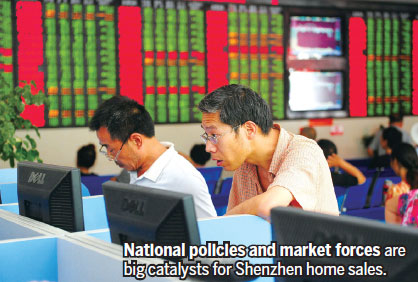Be aware of ties that blind
Updated: 2015-07-24 14:01
By Zhou Mo in Shenzhen(China Daily USA)
|
||||||||

It appears that the Shenzhen property market has been hit by the stocks swing, but there may be other factors fueling the slide.
The mainland stock market has experienced dire times since mid-June, with the benchmark Shanghai Composite Index diving from a peak of 5,166.35 on June 12 to 3507.19 on July 8, before bouncing back to 3823.18 on Thursday.
Encountering a similar fate has been the Shenzhen property market, which saw transaction volume and price both decline in July after months of a buying spree, which has seen many draw a cause-and-effect conclusion.
According to the statistics from the Urban Planning, Land and Resources Commission of Shenzhen Municipality, 1,643 new homes were sold in the city from July 6 to 12, down 6 percent from the previous week. Average price of new homes over the week fell 0.2 percent to 33,226 yuan ($5,351) per square meter.
Having seen average new home prices spiral more than 20 percent year-on-year in the first half of 2015 and reaching a record high of 30,713 yuan per square meter in June, the city's housing market now seems to be cooling down, and not just from the demand side.
Few developers are choosing to launch their projects against the backdrop of the stocks crisis, probably for fear that weak performance of the stock market may ripple across to the property market as well, by devaluing investor capital. From July 6 to 12, only one new residential project was released to the market in Shenzhen.
A real estate agent surnamed Zhang from Centaline Property admitted that the number of customers has fallen in recent days. "Transaction volume in the second half of 2015 may be smaller than that of the previous three months," Zhang said.
Another agent from Midland Realty gave a more specific projection. "Transaction volume in July could drop roughly 30 percent compared with the previous three months."
The immediate cooling down of Shenzhen's real estate market following the stocks slump seems to indicate a close correlation between the two. And given the active stock investment activities in the city, the effect on the property sector could be obvious and significant.
Shenzhen with about 6.3 million had the mainland's third largest number of stock investors as at the end of June, just behind Beijing and Shanghai at roughly 13.8 million and 8.7 million, respectively, according to the Shenzhen Stock Exchange.
The number of investors in Shenzhen increased by 339,816 in just a month, as 338,517 individuals and 1,299 organizations opened stock accounts in June alone.
In terms of trading value, Shenzhen's showing is even more remarkable. Last month, trading value in stocks hit 3.4 trillion yuan, ranking second among mainland cities after Shanghai at 4.7 trillion yuan.
However, industry insiders believe that the stock market volatility is just one among a range of reasons behind the changing climate in Shenzhen's housing market.
Zhang Guoku, vice-president for marketing at JJSHome, a Shenzhen-based real estate company, said stocks turbulence has indeed had some effect on the city's property market, but it is not a decisive factor.
"Shenzhen's housing market was very hot in the first half of this year. Transaction volume of second-hand homes topped 60,000, nearly exceeding the total number of last year. Many people who hope to benefit from the government's new housing policy have already made a deal, so the overall demand is now turning flat," Zhang noted.
"In addition, banks have tightened mortgage loan policies and raised loan interest rates due to voracious demand, which makes it harder for property buyers to make a purchase."
"Stock market is not the direct factor deciding the tendency of the property market. Rather, the real estate market is directly influenced by national policies and supply-demand relationship," Zhang told China Daily.
Zhang's view was echoed by Carlby Xie, head of research at Colliers International China.
"We cannot deny that some investors have lost money on the stock market, which in turn affects their property-buying decisions," Xie said.
"But this phenomenon cannot represent the whole picture. More importantly, I believe the recent fall in transaction volume is caused by the decline in the supply of residential projects and the consequent lack of choice for investors."
Question of fundamentals
He Qianru, manager of Midland Realty National Research Center, shares that view. "It is habitual for people to put the stock and property markets together for comparison, as they are the two main investment channels. The stocks collapse has indeed eroded investors' wealth, but it has yet to affect the property market. Public concern over their relevance is much bigger than the real effect," He said.
"Only when the stock plunge causes systematic financial risk, which results in the tightening of monetary policy, could home prices be considerably affected," she pointed out.
The recent stocks shock, while causing widespread concern, has not been able to alter the fundamental trends in Shenzhen's property market, it is believed.
Xie reckons that the city's housing prices will still run on a rising track in the second half of 2015. "The strong purchasing power of Shenzhen will not be undermined by the stock turbulence," Xie said.
"Home prices in the city are expected to keep rising, but the growth rate will depend on the supply and market positioning of residential projects."
Meanwhile, Zhang expects housing price growth to remain flat in the next two months but heat up again by the end of the year, with demand gradually accumulating.
sally@chinadailyhk.com

 Unusual but true: 'Love' conquers all
Unusual but true: 'Love' conquers all
 Six dead as rainstorms wreak havoc in China
Six dead as rainstorms wreak havoc in China
 Guangzhou Evergrande stun Bayern in penalty shootout
Guangzhou Evergrande stun Bayern in penalty shootout
 10 domestic films to see this summer
10 domestic films to see this summer
 Tricks airports use to scare away birds
Tricks airports use to scare away birds
 The highs and lows of a stock market investor
The highs and lows of a stock market investor
 Culture insider: 7 things you may not know about Major Heat
Culture insider: 7 things you may not know about Major Heat
 Future of Great Wall in Hebei province looks bleak
Future of Great Wall in Hebei province looks bleak
Most Viewed
Editor's Picks

|

|

|

|

|

|
Today's Top News
Astronomers discover most Earth-like planet yet
Flight details of Obama's Kenya trip leaked
2 killed, several injured in Louisiana theater shooting
Deficit hits $104b in first half
Obama to meet extended family members in Kenya
More Chinese companies become world top 500
Earth-like planet discovered using NASA's Kepler space telescope
Ministry denies set date for nationwide two-child policy
US Weekly

|

|







